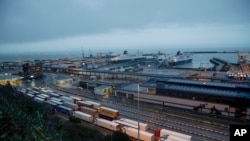Britain will face severe disruptions at its ports and food shortages if it fails to strike a trade deal with the European Union before the end of the year, according to a new report, which also warns that the economic impact of a no deal Brexit would be three times that of the coronavirus pandemic.
Britain officially left the European Union on January 31, and the current transition period is due to end on December 31. The British government warned Wednesday that most businesses that trade with Europe had yet to prepare for the coming changes.
The recent report from Kings College London’s UK in a Changing Europe program warns that “the most immediate and visible impact of a no deal with the EU will be seen at the border, with risks of queues and shortages of food.”
That would be felt most acutely around the port of Dover, where some 4 million trucks use the ferry and Eurotunnel rail crossings to and from Calais, France every year. Even with a trade deal, Britain will leave the EU’s single market and customs union, meaning some new checks and trade barriers will be unavoidable. Without a trade deal, there will be much greater disruption, with Britain and the EU imposing tariffs on each other's goods.
The British government warned Wednesday that up to 60 percent of heavy goods vehicles (HGVs) may not have the right paperwork.
“They'd therefore be turned back by the French border authorities, clogging the Dover to Calais crossing,” Cabinet Minister Michael Gove told lawmakers. “And in such circumstance, that could lead to queues of up to 7,000 HGVs.”
There will also be significant disruption for British travelers to the EU, says Kings College report co-author Jonathan Portes.
“You’ll need health insurance. It’s unclear how international driving permits will work; if you apply to go for work you may well need a visa,” Portes told VOA in an interview Thursday.
Eighty percent of Britain’s economy is made up of services. In London, Portes says banks and financial services are already prepared for no deal. “And so they’ve relocated legal entities, some staff and so on to deal with that.”
JP Morgan Chase is the latest bank to announce such a move this week – shifting $230 billion in assets from London to Germany.
Britain’s economy has already shrunk by a fifth this year owing to the coronavirus pandemic. The report warns the economic effects of a no deal Brexit could be much greater.
"The total cost to the UK economy over the longer term will be two to three times as large as that implied by the Bank of England’s forecast for the impact of COVID-19,” the report notes. It does, however, say the ongoing effects of the pandemic could mask the impact of a no deal Brexit: “If trade, travel, immigration, and tourism stay depressed, extra friction at the border might not impose much in terms of additional costs in the short term,” the document says.
“It’ll just be very difficult to interpret what’s happening in the economic statistics and data because of course we are in this extraordinary period,” says Portes. “Business and government have already got their hands full dealing with the consequences of COVID.”
The biggest political issue could be the fate of the border between the Republic of Ireland and Northern Ireland, which becomes an external frontier between Britain and the EU. There are fears any border checks could trigger a return to sectarian violence. So instead, the Withdrawal Agreement – signed by Britain and the EU last year – mandated border checks down the Irish Sea in the event of no deal.
Earlier this month, London introduced legislation to override that part of the Withdrawal Agreement, effectively breaking international law. Dublin has voiced dismay.
“What has been concerning over the last couple of days for me, from speaking to other EU foreign ministers, is that there's a growing sense that perhaps the UK doesn't want a deal, and that this is more about managing the blame game as the negotiations fail,” Irish Foreign Minister Simon Coveney told reporters Tuesday. “And I reassured them very clearly that in my view that is not the case. I believe that the prime minister and the British government do want a deal, even though they're behaving in a strange way to get that done in terms of the legislation coming through Westminster at the moment.”
Britain maintains it still wants a deal – but one that guarantees sovereignty.
“Change requires preparation. But change is what the British people voted for,” Gove told parliament Wednesday. He said there would be benefits to leaving the EU. “We can strike new trade deals, which help developing nations grow faster and lower prices for consumers. We can develop tailored policies to better support new technologies and to level up our economy. We can invest the money that we currently send to Brussels in the NHS, in our science base, and on improving productivity in all the nations of the United Kingdom.”
EU chief negotiator Michel Barnier visited London Wednesday for informal talks ahead of a ninth round of official negotiations due to begin next week. Britain has given a deadline of October 15 for a deal to be struck. It threatens to walk away from the talks if no deal is reached by then.
Analysts note that even if a deal is achieved, it will be limited in scope owing to the red lines already laid out by London and Brussels and some level of disruption is likely, whatever the outcome.





